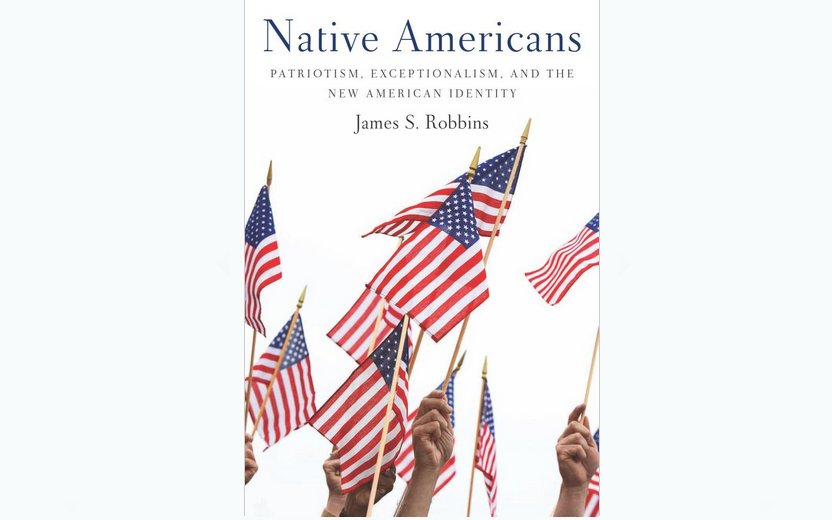The following is an excerpt from the new book by Rare Deputy Editor James S. Robbins, Native Americans: Patriotism, Exceptionalism, and the New American Identity.
Videos by Rare
The Birth of Freedom
America’s natural and radical individualism gave rise to a distinct type of character and politics. When Jefferson wrote, “We hold these truths to be self-evident,” he was saying that what followed was beyond argument, a premise that one could either accept or reject, but which was fully accepted in America. Whether one thought that freedom derived from God or nature, it was agreed that it was something inborn and inalienable.
American notions of freedom have many roots. Roman political theory rejected the Greek notion that humans were naturally part of communities, the instinctive “political animals” that Aristotle wrote about. The Romans believed humans were creatures who were aware of their self-interest and that free people had the ability to give consent to living under law as part of a community of interests. The bond of law, the vinculum juris, is what united the people. The feudal system, which succeeded Roman law in Europe, lost the focus on the individual but retained the notion of the contract as the basis for order and political legitimacy. Feudal government was a complex series of reciprocal relationships in which even the king did not theoretically wield absolute and arbitrary power. The Magna Carta, which English King John was forced to agree to by his rebellious barons in 1215, affirmed that free men held rights under law and the sovereign will was limited by the liberties of his subjects. Though in practice the original document was soon superseded and reissued in various more limited forms, it became a potent symbol for later generations who sought to limit the powers of the absolutist monarchs.
One of the earliest mentions of America in European political writing refers to it as a haven for those seeking freedom. In a 1535 commentary on the book of Deuteronomy, in particular the need to impose the death penalty on blasphemers, Protestant theologian John Calvin wrote:
Some insist that since the offense consists only in words, there is no need for such severity. But we muzzle dogs, and shall we leave men free to open their mouths as they please? Those who object are like dogs and swine. They murmur they will go to America where nobody will bother them.
Ironically, Calvinism, through Presbyterianism and its branches, was so influential in the founding of the American colonies that nineteenth-century German historian Leopold von Ranke concluded, “John Calvin was the virtual founder of America.” The New England version of social contract theory can be traced to Calvin. It went through Scotland where John Knox amended it, then emerged on the shores of the New World modeled on the agreement God made with the Israelites. This sense of freedom, and particularly the freedom not to be bothered (much less executed for blasphemy), is central to the concept of America.
From Federal theology came the idea that society exists as a contract. It was not primarily an American notion—the Roundheads during the English Civil War (1642–1651) had agitators preaching this theory in every military unit to justify the right to participate in a revolution against the Crown. But the discovery of the New World had a major impact on the imaginations of European political thinkers. The social contract theorists saw in America the ungoverned “state of nature” that formed the starting point for their theoretical construct.
“In the beginning the whole world was America,” wrote John Locke in 1689. By that he meant an untouched wilderness free of government. Forty years earlier Thomas Hobbes, in a famous passage in Leviathan, had described “mere nature” as a state of “continual fear, and danger of violent death; and the life of man, solitary, poor, nasty, brutish, and short.” And while Hobbes believed that such a condition never existed generally all over the world, “the savage people in many places of America, except the government of small families, the concord whereof dependeth on natural lust, have no government at all, and live at this day in that brutish manner.”
Hobbes was wrong about the lack of government among the Indians, who had varying degrees of social organization. Indeed the notion of the “noble savage” who lived in splendid natural anarchy became something of a holy grail for anthropologists, and was sought around the world for centuries, but never found. Yet even before Hobbes the notion of a state of nature where men were or became free simply by being there was alive in the minds of the common people.
In June 1609 the Royal Virginia Company’s flagship the Sea Venture was leading a fleet of seven ships on a supply mission to the new colony at Jamestown. A storm blew up and the ships were separated. After several days the Sea Venture was grounded on the reefs of Bermuda to save it from foundering. Passengers and crew numbering 150 people and a dog made landfall on the Isle of the Devils and were forced to survive as best they could. But after six months ashore, some of the crew, among them a clerk named Stephen Hopkins, mutinied against the leadership of the company. They reasoned that because they were not in the chartered domain of the Virginia Company, they were in a state of nature, thus should be free to choose their own leaders and do as they please. The mutiny failed and Hopkins was sentenced to death. He begged for his life and was spared. Later the survivors fashioned ships to continue their voyage, and Hopkins spent several years in Jamestown before returning to England.
Fast-forward to 1620 and the good ship Mayflower carrying the Pilgrims, also under the charter of the Virginia Company, which had authority north to the mouth of the Hudson River. But the ship was blown off course and wound up off the coast of Cape Cod. There followed some “discontented and mutinous speeches that some of the strangers amongst them had let fall from them in the ship: that when they came ashore they would use their own liberty, for none had power to command them.” Coincidentally, among the passengers was the former castaway Stephen Hopkins.
William Bradford immediately wrote up a document in which the signatories agreed, “solemnly and mutually, in the presence of God, and one of another, [to] covenant and combine our selves together into a civil body politic, for our better ordering and preservation and furtherance of the ends aforesaid; and by virtue hereof to enact, constitute, and frame such just and equal laws, ordinances, acts, constitutions and offices, from time to time, as shall be thought most meet and convenient for the general good of the Colony, unto which we promise all due submission and obedience.” The Mayflower Compact was thus an original, genuine, literal, and specific social contract that predated the writings of Hobbes and Locke by decades. As for Stephen Hopkins, he lived well in the New World, although he later ran afoul of the authorities by opening one of the colonies’ first taverns. It was another of his significant contributions in the development of American liberty.
James S. Robbins is Deputy Editor of Rare and author of Native Americans: Patriotism, Exceptionalism, and the New American Identity. Follow him on Twitter @James_Robbins



